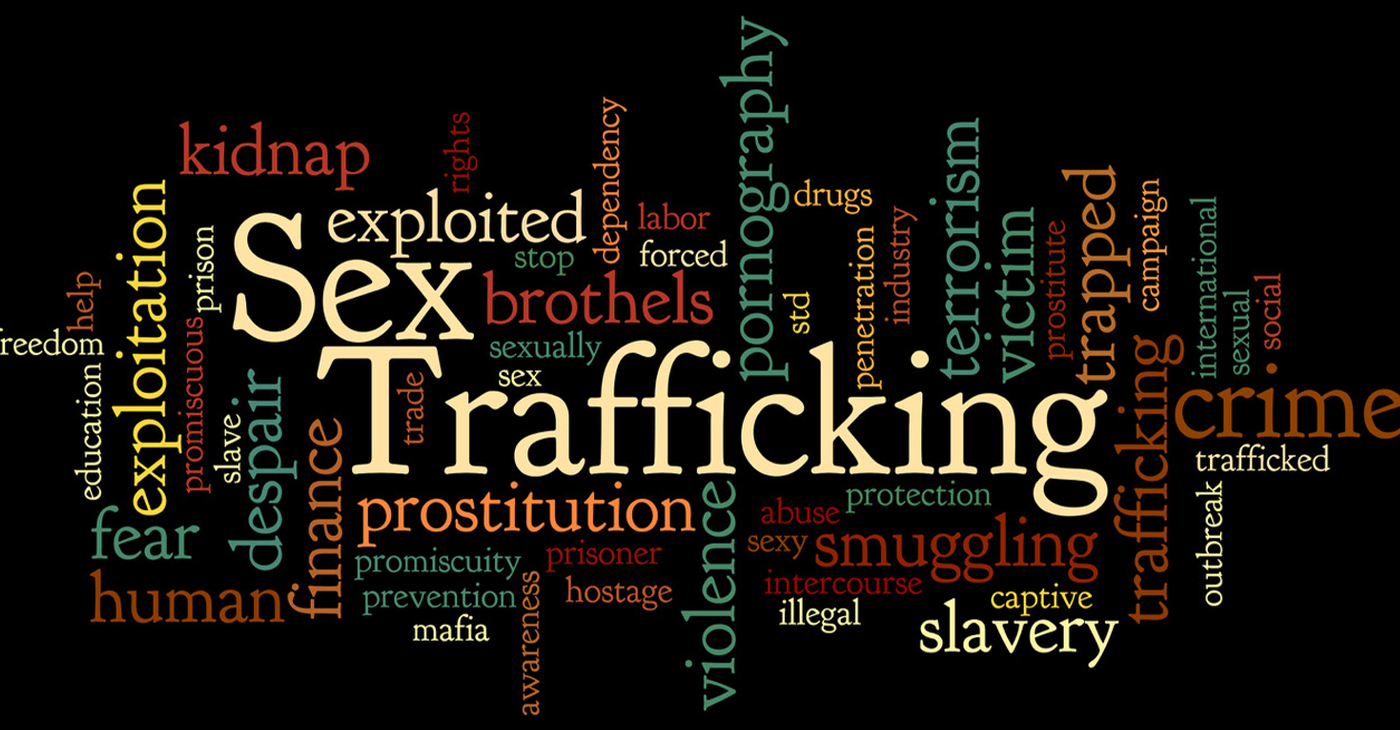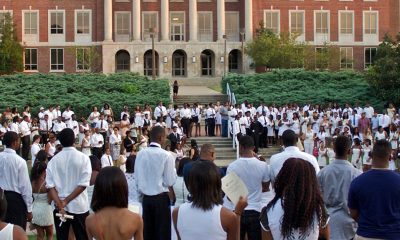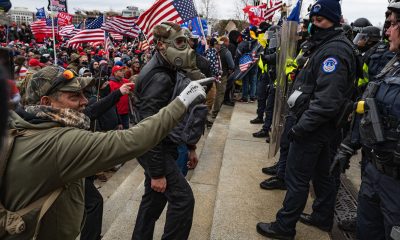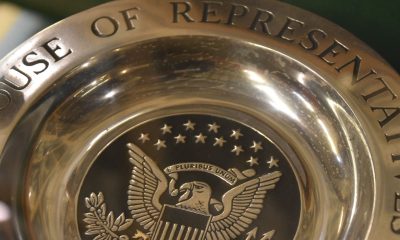Crime
DOJ Holds Local Hate Crime Forum
THE TENNESSEE TRIBUNE — It’s been six months since the racially-motivated desecration of Walnut Grove Missionary Baptist Church, another incident in a growing trend of such crimes over the past few years.
By Ashley Benkarski
MURFREESBORO, TN — It’s been six months since the racially-motivated desecration of Walnut Grove Missionary Baptist Church, another incident in a growing trend of such crimes over the past few years.
This isn’t the first time a place of worship has been attacked here—the Islamic Center of Murfreesboro was the target of a hate crime in August 2010, an act that garnered national attention and was featured on Comedy Central’s “The Daily Show with Jon Stewart.” It was vandalized again in 2017.
To address the community’s concerns over safety in places of worship, the Community Action Committee of Rutherford County and the Department of Justice’s Community Relations Service hosted a forum Mar. 5 at Middle Tennessee State University’s Tucker Theater that featured attorneys, federal, state and local law enforcement officials and local religious organizations. Attendees were given the opportunity to ask questions between panels to encourage open dialogue between congregations and the law enforcement community.
“No threat should be taken lightly,” Frank Haera, ATF supervisor, said. He added that congregations should be made aware and plans put in place for safe and effective emergency management in the event of a violent act. Law enforcement speakers stressed the importance of cameras and good lighting as deterrents as well as helping identify perpetrators.
The forum is one part of the CRS initiative to protect places of worship through educating the community about hate crimes and providing guidance for safety in the event of violence, such as bomb threats, arson or an active shooter situation. CRS also “works with communities in conflict to help rebuild relationships, facilitate mutual understanding, and encourage the development of local solutions.” It was established by Title X of the Civil Rights Act of 1964 and its mandate expanded in 2009 via the Matthew Shepard and James Byrd, Jr. Hate Crimes Prevention Act.
A hate crime is defined by the FBI as “a criminal offense against a person or property motivated in whole in or in part by an offender’s bias against a race, religion, disability, sexual orientation, ethnicity, gender, or gender identity,” with statutes varying by state. In Tennessee, a crime has to satisfy one of two requirements before it can be classified as a hate crime: 1) the act violated the civil rights of another via intimidation or coercion and 2) the act was committed against a place of worship. Hate crimes statutes are applied as enhancements to other offenses, such as vandalism, if the crime was motivated by bias against the victim. Victims are allowed input on the offender’s sentence—houses of worship are known to ask for hate crime charges to be dropped in an act of forgiveness—but the decision is ultimately up to the judge.
The existence of such hatred is a sad reality. “We are living in a strange time,” said ICM spokesperson Dr. Saleh Sbenaty, adding that “the political climate is not helping to heal the wounds” of the divided nation. “We are all God’s children,” said Rev. Richard Sibert of Walnut Grove.
The TBI’s 2017 report on hate crimes notes that anti-black bias was the motivation for the majority of crimes against persons and property, with crimes against persons being the most reported bias-motivated offenses. Intimidation, simple assault and aggravated assault were the most reported incidents against persons, with aggravated assault incidents reported at 38 in 2017, up from 19 the previous year. Destruction/damage/vandalism have been the leading reported crimes against property for the last 3 years; however, the number of incidents under this category has decreased 13.2 percent from 2016-2017.
If you or your congregation receive a threat, report it immediately by calling 911. For more information on hate crime statistics across the state, visit https://crimeinsight.tbi.tn.gov.
This article originally appeared in The Tennessee Tribune.
Activism
Calif. Anti-Sex Trafficking Advocates Discuss Competing Bills, Strategies
Advocates from across California are challenging state officials and community leaders to support legislation that provides resources and services for survivors and victims of human trafficking, as well as assistance as they transition back into civil society. Some of those advocates are also calling for more effective state policy to curtail trafficking, a crime that has an outsized impact on Black children, particularly girls.

By Bo Tefu, California Black Media
Advocates from across California are challenging state officials and community leaders to support legislation that provides resources and services for survivors and victims of human trafficking, as well as assistance as they transition back into civil society.
Some of those advocates are also calling for more effective state policy to curtail trafficking, a crime that has an outsized impact on Black children, particularly girls.
According to the FBI, a report covering a two-year period found Black children accounted for 57% of all juvenile arrests for prostitution. In addition, 40% of sex trafficking victims were Black and 60% of those victims had been enrolled in the foster care system.
“It is time to hold the perpetrators who take advantage of our children accountable,” said the Rev. Shane Harris, a San Diego-based activist, former foster youth and founder of the Peoples Association of Justice Advocates, (PAJA), a national civil rights organization and policy think tank.
“It is time to send a thorough message that if you seek to buy a child for sex, you will pay the highest criminal penalties in this state,” added Harris who was speaking at a rally at the State Capitol earlier this month. Harris was speaking in support of Senate Bill 1414, authored by Sen. Shannon Grove (D-Bakersfield), which calls for people who buy sex from minors to be punished with a felony. The punishment includes a two-year prison sentence and a $25,000 fine.
Harris said the PAJA is the only civil rights organization in the state that supports SB 1414.
Harris urged other Black-led groups who favor anti-trafficking legislation more focused on criminal justice reforms (as opposed to stiffer penalties), to “join the movement.”
Many of those civil rights groups fear that SB 1414 could lead to the incarceration of more Black youth.
Those sentiments were echoed in a panel discussion organized by Black women advocates on April 26 to examine the cause and effects of human trafficking in California’s Black communities. The virtual event was hosted by the Forgotten Children, Inc, a faith-based nonprofit that advocates for survivors and victims of human trafficking through anti-trafficking campaigns and initiatives.
Panelists shared the psychological impact of sexual exploitation on youth and children in the long term.
Author and educator Dr. Stephany Powell shared statistics and information revealing that African American women and girls are the most trafficked nationwide.
Powell, who serves as the senior advisor on law enforcement and policy at the National Center on Sexual Exploitation said that national data indicates that sex trade survivors are disproportionately women of color. She stated that male survivors often go unnoticed because boys rarely report trafficked crimes.
Powell said that decriminalizing prostitution in California could increase human trafficking. She argued that Senate Bill 357, authored by Sen. Scott Wiener (D-San Francisco), which was signed into law in 2022 and legalized loitering for prostitution, caused a surge in street-level prostitution.
Panelist and psychologist Dr. Gloria Morrow shared opposing views on decriminalizing prostitution. She said that decriminalizing prostitution could help survivors gain access to state resources and support.
Despite opposing views, Powell and Morrow agree that the Black community needs resources and educational programs to address human trafficking.
Activism
Oakland Post: Week of May 1 – 7, 2024
The printed Weekly Edition of the Oakland Post: Week of May 1 – 7, 2024

To enlarge your view of this issue, use the slider, magnifying glass icon or full page icon in the lower right corner of the browser window. ![]()
Activism
Oakland Post: Week of April 24 – 30, 2024
The printed Weekly Edition of the Oakland Post: Week of April 24 – 30, 2024

To enlarge your view of this issue, use the slider, magnifying glass icon or full page icon in the lower right corner of the browser window. ![]()
-

 Community2 weeks ago
Community2 weeks agoFinancial Assistance Bill for Descendants of Enslaved Persons to Help Them Purchase, Own, or Maintain a Home
-

 Activism4 weeks ago
Activism4 weeks agoOakland Post: Week of April 3 – 6, 2024
-

 Business3 weeks ago
Business3 weeks agoV.P. Kamala Harris: Americans With Criminal Records Will Soon Be Eligible for SBA Loans
-

 Activism3 weeks ago
Activism3 weeks agoOakland Post: Week of April 10 – 16, 2024
-

 Community3 weeks ago
Community3 weeks agoAG Bonta Says Oakland School Leaders Should Comply with State Laws to Avoid ‘Disparate Harm’ When Closing or Merging Schools
-

 Community2 weeks ago
Community2 weeks agoOakland WNBA Player to be Inducted Into Hall of Fame
-

 Community2 weeks ago
Community2 weeks agoRichmond Nonprofit Helps Ex-Felons Get Back on Their Feet
-

 Community2 weeks ago
Community2 weeks agoRPAL to Rename Technology Center for Retired Police Captain Arthur Lee Johnson























































